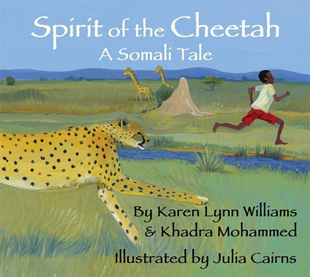Karen Lynn Williams and Khadra Mohammed have teamed up before to bring us two edifying books about refugees: My Name is Sangoel and Four Feet, Two Sandals. In this new collaboration, their focus turns to a Somali coming-of-age story, exuberantly illustrated by Julia Cairns, whose ten years spent in Botswana have given her deep appreciation for the resilience and fortitude of the people of Africa.
The book centers around Roblay, a boy immersed in practice for a big race with an important prize: The three winners will be declared men. Roblay's running style divulges that he's not quite there yet. When he runs to the well to fetch water, it sloshes out of the bucket; when he passes the wood seller at the market, he knocks over the man's wood pile. And sure enough, when the big race comes, Roblay does not finish in the top three.
Approaching his grandfather for help, Roblay learns that he must capture the spirit of the mighty river Shabelle by leaving his thumbprint on a cheetah's coat. The cheetah, his grandfather explains, "unites our clans and carries the thumbprints of all those who have proven themselves as men."
As you may know — and as the authors explain in notes at the book's end — cheetah's are earth's fastest land animals and can reach speeds of up to 75 miles per hour, going from speeds of zero to 60 in just three seconds. So the grandfather is hardly setting before Roblay an easy task! But as always happens with initiations, the very work of doing something that seems impossible builds in him some necessary attributes of manhood: patience, grace, and swiftness. Even more importantly, it connects him intimately with the cheetah, so that when he finally leaves his thumbprint, the animal and the boy hold each other's gaze before he retreats.
The notes at the book's end are realistically poignant and sobering. For instance, "the global cheetah population living in the wild today is estimated at around 7,000, sharply down from approximately 100,000 in the year 1900," due to "habitat encroachment, poaching, illegal pet trade, vehicle collision, and conflict with humans, especially over livestock." So Spirit of the Cheetah — written for ages four to eight — serves not only as a story of becoming a man, but also as inspiration for any young wildlife enthusiasts who might someday join the fight to save vulnerable species.
